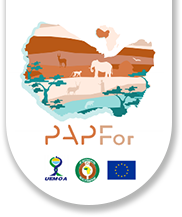Home / News / Logistical support expected to be a game changer in the conservation of (...)
Logistical support expected to be a game changer in the conservation of Mount Nimba Forest Reserve in Guinea
The town of Gbakore in Lola Prefecture, Nzérékoré, Guinea, was founded in 1922 by warriors seeking land to build a settlement around Mount Nimba, the highest mountain in the region, which straddles the borders of Guinea, Côte d’Ivoire and Liberia. Now a nature reserve of around 12 540 hectares (shared between Guinea and Côte d’Ivoire), Mount Nimba is home to rich flora and fauna including the endemic Nimba viviparous toad (Nimbaphrynoïdes occidentalis), the Nimba otter shrew (Micropotamogale lamottei), and the Western chimpanzee (Pan troglodytes verus), which uses stones as tools to find food and live naturally in the forest.
The inhabitants of Gbakore, are largely dependent on the forest, and although Mount Nimba was declared a World Heritage Site by the United Nations Educational, Scientific and Cultural Organization (UNESCO) in 1981, the nature reserve is still threatened by mining, hunting, bushfire, habitat destruction, shifting cultivation agriculture and the existence of invasive species. As a result, Mount Nimba is now listed as a World Heritage Site in danger.
In a bid to support the reserve’s management agency on its Guinean side, the Centre de gestion de I’environnement des Monts Nimba and Simandou (CEGENS), in its fight against illegal activities in the forest, the EU PAPFor programme through its implementing partner, United Nations Office for Project Services (UNOPS), has proposed the construction of a base to be built in Gbakore. The base will provide the agency with a single secure location to station their field agents and equipment. Due to its strategic location, field agents will have easy access to the forest for patrols and will be able to respond to illegal activities very quickly.
Such a base had been under construction by the government since 2010, but the project had halted, and the structures were in ruins. EU-PAPFor has proposed to reconstruct the base through UNOPS, which has conducted a study to ensure stability of the existing structures, neglected for over 10 years. “We don’t want a situation where after completion of the base, it collapses. That is why we had to conduct research to determine the next step to either continue from where the government stopped and demolish the old structures or erect new ones,” said Oye KALIVOGUI, head of logistics with UNOPS in Nzérékoré, Guinea.
Over the years, there has been an increase in human activities within the reserve whilst there are limited resources such as transport, equipment and training to facilitate proper monitoring. Recently, CEGENS received reports that Ivorian nationals had established a settlement within the forest. It was investigated and found to be accurate, and the illegal occupants have since left the forest reserve.
According to the acting director of CEGENS, Moriba Kpoghomou, intruders from Burkina Faso and Cote d’Ivoire had also been planting cocoa in the middle of the forest. “This is under control now,” he said, adding that there has been a decline in the rate of cross-border crimes such as hunting and animal breeding. He explained that livestock breeders also destroy the forest to create fresh green pasture for their animals. This involves setting fire to the forest and destroying all the biodiversity in the area.
With the intervention of EU-PAPFor through UNOPS, CEGENS staff have been trained in the use of geographic information system (GIS) mapping (to manage data), and a new Toyota Hilux was donated to their office in support of their mission to conserve the forest. In addition, CEGENS has established a new transboundary collaboration and partnership with the Forestry Development Authority (FDA) in Liberia and the Office Ivorien des Parcs et Reserves in Cote d’Ivoire (OIPR) for the effective monitoring and control of the border area.





